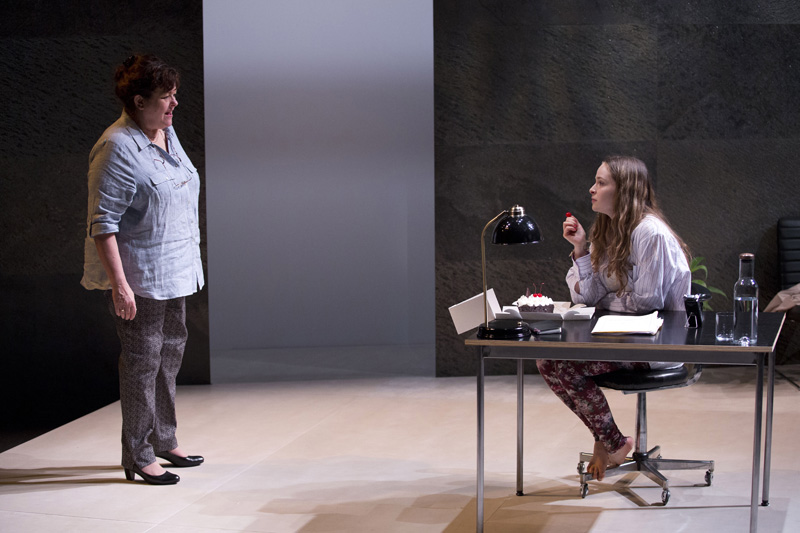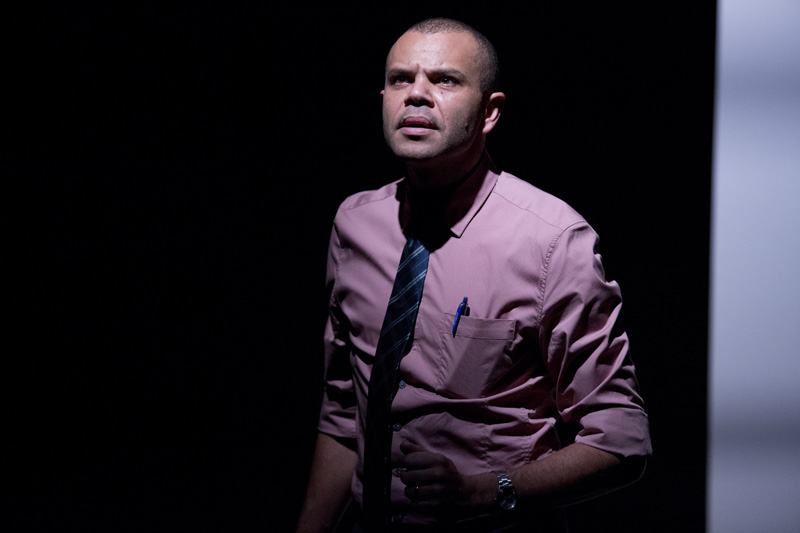★★★★☆ A new Australian play is always exciting; one that’s also an Australian Gothic thriller, doubly so.
Wharf Theatre
August 2, 2016
Six days before The Hanging begins, 14-year-old schoolgirl Iris Hocking (Ashleigh Cummings) and her “BFFs” Hannah and Ava, disappear from their elite private school. Two days later, Iris appears at a police station alone, distressed and remembering nothing. The media is ablaze and Detective Flint (Luke Carroll), a specialist in child protection, is put on the case.
The action is set in the house of Iris’s father where Flint is making poor headway interviewing the teenager after her release from hospital. Soon after, Iris’s English teacher Ms Carrossi (Genevieve Lemon) arrives at the girl’s request she be present during the interview that is the material of this 90-minute one-act play.
Carrossi is cantankerous and fiercely intelligent, claiming “if you’re not depressed, you’re not thinking”. Neither adult knows why Iris has called her there but it turns out the teacher’s relationship with the girls is the mystery’s missing link.

Genevieve Lemon and Ashleigh Cummings
To reveal more would be to spoil an extraordinarily well-executed psychological thriller by Angela Betzien, directed under the steady hand of Sarah Goodes. The play’s revelations arrive at exactly the right pace and potency: at times in a flurry, before curdling into uncertainty again. We feel as frustrated as Flint does with Iris’s insolence and evasions and we will him to do his detective work well. Time is ticking – and two girls are still missing.
Above and all around Elizabeth Gadsby’s sparse set are screens on which the Australian bush is projected. When the play begins we learn fires are burning out of control nearby. They’re only mentioned in passing but their menace lingers in boughs that shift in a breeze you imagine is thick and hot.
Drawing on Australian Gothic tropes, the bush does not set the scene but acts within it: as hostile and sentient as a silent fourth character. It is the pull of the unknowable; the risk of escape. But only Iris sees it. She leaves the room often, where her teacher and interrogator are locking horns, to stand on the roof close to the bush in a liminal space between fantasy and reality.
The leaves are blackened like the fire has already passed through. It hasn’t – the threat never transpires – but the suggestion of a parallel reality in which this landscape is burnt-out underscores the perpetual sense of unease in a play where nothing is certain – not even time or space.
“Am I alive?” says Iris, and then: “How do you know?” Later, she talks of a man standing by her bed the night she disappeared, swallowing her “piece by piece” until she was gone. “How do I know what’s real and what’s a nightmare?” she says in anguish. The miracle is how lines like this – which in a lesser production may sound adolescent – resonate so deeply with an adult audience.

Luke Carroll
The answer is Betzien’s writing. She feeds us clues as delicately as a mother to a baby bird, leaving us hungry to the end, and past. Her writing is lushly poetic yet tight too: the script is dense with its characters’ delusions as well as literary references and interlinked metaphors that all come full circle. That it manages all this without drifting from its duties as a thriller is impressive. It’s a script you want to buy and read.
The production is not without flaws. The opening dialogue between Iris and Flint is rigid. And while Cummings’ emphatic voice could be that of a private schoolgirl feigning confidence, it would be nice to hear the voice of a regular teenager too. But any tenseness melts away when Lemon enters – her command over her role and charisma onstage generally, rippling out to calm the other actors.
Video footage is perhaps overkill, too. At various moments, the screens show three girls in dresses drifting, entranced, through the tangled bush. It too overtly channels 1975 film Picnic At Hanging Rock and is perhaps too literal a touch for a play so committed to demonstrating the evocative power of words.
These are small gripes. The Hanging was financially supported by a Sydney Theatre Company ‘giving circle’ of 15 women who were presumably as captivated and cast back as I was by how eloquently Betzien tapped the inner world of adolescent girls, a demographic whose viewpoint can be brutally easy to dismiss.
“No-one ever believes us,” Iris says to Ms Corrossi. Her teacher is first to criticise girls who “act as celebrities in their own feature films” but to this, even she must agree.
The Hanging plays at Wharf I Theatre until September 10











Comments
Log in to join the conversation.